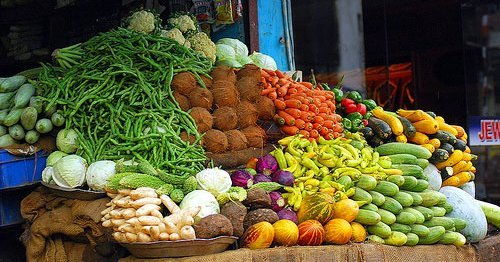Agricultural specialists have prepared the working documents and the national briefing books. However, the specialists nearly all agree that “politics is not their business”. Thus the analysis of production, storage, transportation and marketing factors are usually well done, even if national statistics have to be taken with several grains of salt. Yet political questions are seldom asked. Achieving food security like achieving sustainable development and social progress will require changes in policy orientation, institutional arrangements and a willingness to deal with difficult political issues.
The World Food Security Summit could have been an opportunity for world leaders to view the present economic and social system with a critical eye and to examine the reasons why it leads to a pattern to enrich the rich and marginalize the poor. But such an examination can lead to disputes and to an atmosphere not conducive to fund-raising, often a major aim of such meetings. In this case, however, even without political discussions, specific fund-raising was not part of the final statement. At such meetings, the rich have already eaten, and the marginalized are unorganized.
"The Rich Have Already Eaten” was a phrase from Rev. Andres Giron, a Guatemalan priest, leader of the National Peasant Association for Land, used as the title of a hard-hitting study of agricultural conditions in Central America by Solon Barraclough and Michael Scott. [1] They analysed the issues of land tenure, agricultural production and food security, demonstrating how the vast majority of the rural population of Central America had been dominated, exploited and deprived of any voice in government by a small minority of oligarchs and military officers. Thus hunger is a sign of a political struggle for social justice and reform and should not be looked at as only a question of agricultural production and distribution.
Achieving food security like achieving sustainable development and social progress will require changes in policy orientation, institutional arrangements and a willingness to deal with difficult political issues.
Despite the fact that millions of peasants, landless labourers and urban dwellers suffer from hunger and malnutrition, the political issues concerning food production, distribution and costs have fallen off the world agenda except for specialists. Occasionally questions of export subsidies of agricultural products or production quotas are taken up by the World Trade Organization or in the all-night negotiations of the Agriculture Ministers of the European Union, but the complexity of the issues and the political power of the large farm associations in the USA and Western Europe have kept agricultural policies outside active political debate.
Nevertheless, governmental food and agriculture policies need to be analysed and reviewed carefully. The agricultural policies of the European Union and the larger food exporting countries — USA, Canada, Brazil, Australia — need to be reviewed, and the impact of agricultural subsidies and export encouragement looked at beyond trying to build political support from farmers. In addition, the role of the private sector needs to be looked at carefully. There needs to be a detailed analysis of the role of speculation in the rise of commodity prices. There has been a merger of the former Chicago Mercantile Exchange and the Chicago Board of Trade to become the CME Group Market which deals in some 25 agricultural commodities. Banks and hedge funds, having lost money in the real estate mortgage packages, are now looking for ways to get money back. For the moment, there is little governmental regulation of this speculation. There needs to be an analysis of these financial flows and their impact on the price of grains.
Food security cannot be separated from other community needs such as access to water, sanitation, health and childcare as well as environmentally unsustainable sources of fuel. Under-nourishment, starvation and famine are influenced by the working of the entire economy, not just food production and agricultural activities.
Nevertheless, it is useful to have a systematic approach to the study of the food chain and food security such as that developed when Solon Barraclough was Director of the United Nations Research Institute for Social Development (UNRISD). As Barraclough wrote in his Preface to the important methodological presentation of Rolando Garcia “We wished to emphasize the need to study food production and consumption together with all intermediate steps in their broader societal context. For us, a system was merely another way of stating the common sense observation that while everything is interrelated, some things are more interrelated than others.” [2]
In his analysis of food security, the late Solon Barraclough had pointed out “Food security means access to food for a healthy life by all people at all times. For analytical purposes the concept of food security can usefully be broken down into five components. These can be applied for the evaluation of food systems at diverse levels ranging from households and communities to nations and groups of nations:
- "A food system offering security for its participants should have the capacity to produce, store, import or otherwise acquire sufficient food to meet the needs of all its members at all times.” In the same spirit, the FAO defines food security as “Food is available at all times, that all persons have means of access to it, that it is nutritionally adequate in terms of quantity, quality and variety, and that it is acceptable within the given culture.”
- “Food security should provide maximum autonomy (without implying autarky), thus reducing vulnerability to market fluctuations and other social and political pressures.” Whether food is traded across border or not, the distance food travels is a useful indicator of energy use. The more that food is local, the more farmers can grow a variety of crops.
- "Food security should be reliable, so that seasonal, cyclical and other variations in the access to food are minimal.” Stability requires minimizing the probability that, in difficult years or seasons, food consumption might fall below consumption requirements.
- "A secure food system should be equitable, meaning as a minimum, dependable access to adequate food for all individuals and groups both now and in the future.” Equitable draws attention to the fact that, even with bountiful supplies, many people still go hungry because they are too poor to produce or purchase the food they need.
- “It should be socially and environmentally sustainable so that the ecological systems on which all societies and food production depends are protected and enhanced over time.” If food needs are met through exploiting non-renewable resources or degrading the environment, there is no guarantee of food security in the longer term.
The UN cannot impose upon governments a willingness to discuss political policy or a willingness to face the contradictions between policy statements and action. The UN is, as the World Food Security Summit showed, primarily the representatives of the member governments. The FAO or other UN agencies can provide studies that highlight issues but tend in most cases not to provide policy analysis or imaginative proposals.
Some fresh initiatives can come from the representatives of non-governmental organizations (NGOs) but such initiatives require strong leadership and support in a number of different geographic areas. On food security, there was no leadership from the representatives of governments, nor the FAO secretariat, or from NGOs. The result is that the final declaration of the Summit is a reflection of the lowest common intergovernmental denominator. There would have been some opportunity for strong diplomacy setting out plans that were politically and operationally within reach. However, all diplomatic energy is tied up with the difficult preparations for the Copenhagen Conference on Climate Change in December. Thus at Rome, the press stressed the effort of Colonel Kadafi to give out copies of the Koran and his own little Green Book to pretty young girls. All may not have been lost, but little progress will have been made in dealing with the structural causes of food insecurity.


Follow the comments: |
|
